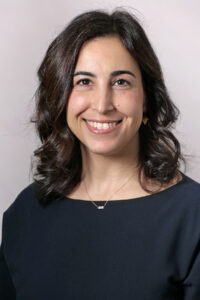By David Wilkening, Contributing Writer

REGION – Your skin is the largest organ in your body, and often serves as the first defense against infections and injuries. So it’s no wonder dermatologists promote that protection of it is vitally important to your health.
“UV light exposure increases the risk of developing skin cancers such as melanoma, squamous cell carcinoma and basal cell carcinoma,” said Dr. Ahou Meydani, interim division chief of dermatology at Cambridge Health Alliance. “It also damages collagen in the skin, reducing the skin’s elasticity, making it more prone to bruises. Older skin already has reduced skin elasticity, so it is important to minimize further damage by protecting it from the sun.”
Preventing sun damage
Here are six tips from Meydani for protecting the skin from sun damage and recognizing the signs of skin cancer.

“Healthy skin is what we present to the outside world,” says Dr. Ahou Meydani of the Cambridge Health Alliance. “It helps us feel more confident, helping to improve our self-esteem and quality of life at every age.”
Photo/Submitted
- Wear a broad-spectrum sunscreen with SPF 30 or higher on all areas not covered by clothing. Reapply sunscreen every two hours when you are in the sun, or after sweating or swimming.
- Wear sun protective clothing, such as broad-brimmed hats, sunglasses with UV protection, lightweight, long-sleeve shirts, and pants. Wear shoes that cover the feet completely.
- Seek shade when appropriate, remembering that the sun’s rays are the strongest between 10 a.m. and 2 p.m.
- UVA penetrates glass, so don’t forget to wear sunscreen when on the road, or when sitting in front of a window.
- Do NOT use tanning beds. Tanning bed use, even only once, increases your risk of developing skin cancer, and it accelerates signs of skin aging.
- Eat a well-balanced diet rich in different types of fruits, nuts and vegetables. They contain micronutrients and antioxidants that are needed to protect the skin against sun damage and inflammation. This is particularly important in older adults because their natural antioxidant defenses are not as strong as they were when they were younger.
Checking for skin cancer
Early identification and treatment of skin cancer, especially melanoma, gives you the best chance of a successful outcome. Meydani provided the following guidance for recognizing the signs of skin cancer.
- ABCDE is a handy mnemonic for remembering the signs of melanoma, the deadliest form of skin cancer. If you notice one of these features in a mole, you should have it checked by a board-certified dermatologist as soon as possible: Asymmetry (if one side of the mole is different from the other); Border (if the border is irregular as opposed to smooth); Color (if there are multiple colors or a change in color); Diameter (if it is bigger than a pencil eraser); Evolution (if there is a change in size, shape or color).
- If you notice a sore that has not healed, a growing bump, or a rough, scaly bump, those could be a sign of basal cell carcinoma or squamous cell carcinoma, common skin cancers that should be evaluated and treated by a board-certified dermatologist.
Skin care tips
AlerisLife, one of the country’s largest senior living companies, also has some thoughts on the subject of skin care. The Newton-based company says on its website: “As you age, your skin naturally ages along with you. The production of collagen and elastin slows down, which causes your skin to lose some elasticity. Skin also becomes thinner and more fragile; glands lose their ability to effectively moisturize the skin; and it’s therefore common for older adults to have dry skin.”
“Besides these natural effects of aging, the environment can have a compounding effect, including when a person gets too much sun or has been exposed to harsh weather conditions. A person’s ethnicity and heredity are also factors in how his or her skin ages,” the site added.
Aleris offers these skin care tips:
Wash gently. Use warm water rather than hot when you wash and avoid taking too many baths or showers. Use mild cleansers rather than harsh soaps and alcohol-based products. Avoid bath oils as they make the tub slippery, increasing the risk of falling.
Moisturize your skin. Consider a fragrance-free moisturizer and keep your skin well-hydrated to help prevent the cracking and itchiness that can accompany dry skin. This will help to prevent the “itch-scratch-rash-itch cycle.”
Don’t smoke. Smoking damages your skin in numerous ways, contributing to wrinkles and otherwise aging your skin. Blood vessels in the outer layer of skin narrow in smokers, reducing blood flow and depleting the skin of nutrients and oxygen. Collagen and elastin, which provide elasticity in skin, are damaged by smoking, as well.
Put a humidifier in your home to add moisture to the air.
Limit drying substances. Using too much soap, perfume or antiperspirant can make dry skin worse.
See a doctor if you skin continues to be dry and itchy.
Meydani, who graduated from Brown University and Yale School of Medicine, noted that “Sometimes older adults don’t realize that, as part of the natural aging process, their skin, and its needs, change. They also don’t realize that as a result, they need to make changes to their routines, like increasing moisturizer use or decreasing baths. Since people have developed self-care routines they have used for over 50 years,” she explained, “it can be difficult to make a change in routine.”
However, in her experience, she has found older adults are often more consistent in skin protective measure than younger people. “Perhaps because they themselves, or someone they know, had skin cancer, or they witnessed the effects that sun had on accelerating signs of aging in their parents,” she said, “they are more vigilant about sun protection. “
“Healthy skin is what we present to the outside world,” said Meydani. “It helps us feel more confident, helping to improve our self-esteem and quality of life at every age.”
RELATED CONTENT:
Plant-based “superfoods” touted to prevent disease and prolong life (fiftyplusadvocate.com)
Proper hydration is important for your health (fiftyplusadvocate.com)
AARP Massachusetts presents webinar series on brain health (fiftyplusadvocate.com)












